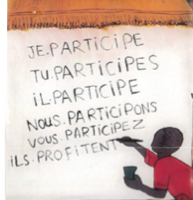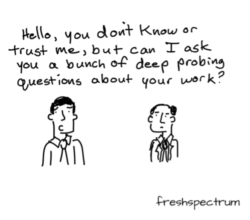Whose voice? Why we must change our T&Cs
| 12 October 2022 | QuIP Articles
Bath Social & Development Research was set up in 2016, and in the intervening years we have had many interesting conversations about how and why the company was set up outside of its roots in the university sector, why it’s a non-profit and most of all how on earth we make the idea of blindfolding work in practice and ethically. This blog reflects some of our latest thoughts on the last of these questions.
We are an independent consultancy not funded by anyone, with the aim of being self-sufficient as we try to achieve our goals, which include being a constructively disruptive influence on research and development practice through our application and promotion of the Qualitative Impact Protocol (QuIP).
“Our vision is a world where the voices of people and communities are at the heart of the policies and practice that promote sustainable development, well-being and social justice.
We are interested in and will look for opportunities to showcase how good qualitative methods can improve how we learn from any intervention with a social aim, placing a high value on the testimony of intended stakeholders.”

We are not a campaigning organisation, but we do strongly advocate seeking ways to strengthen the voice of those often marginalised by the development process. The QuIP has many features, but the key starting point is that asking people what they think has caused change in their lives should be an important part of any evaluation. We have worked hard to try to mitigate confirmation bias and lack of transparency in data analysis – given that these are often cited as reasons not to trust such evidence – and this includes often not divulging the name of the commissioner or project in interviews, so respondents are left ‘blindfolded’.
But what about our commitment to the respondents who take time to share their experiences, who often ask us what will happen to the data, and question whether they will see any change in their lives as a result? We have strongly advocated that communities/ organisations/ groups where interviews have been conducted should be involved in ‘unblindfolded’ feedback workshops; seeing the results and feeding into what that means for adaptation or next steps in a project. Some commissioners do this, but many don’t, and we generally don’t know much about what happens to the data we collect and the ‘feedback’ we help to provide.
So, are we ‘walking the walk’? Honestly? No, not always.
There have been times when I have felt frustrated and uncomfortable at the point when we complete a contract and are left not knowing what ‘closing the feedback loop’ means for the people we interviewed, if anything. What can we do to strengthen ‘the agency’ of both ‘intended beneficiaries’ whose views we collect and indeed the views of our colleagues who interview them? Of course, we already have procedures in place for ethical clearance, anonymisation, whistleblowing, compensation and safeguarding to protect researchers and respondents through the process of data collection, analysis and storage. But is this enough?
One small additional step that we plan to make in future studies is to adopt an ‘opt-out’ rather than ‘opt-in’ approach to unblindfolding respondents and those who interview them at the end of each study. Furthermore, we are not willing to leave it to commissioners to decide about this. If they do opt out of any plan to follow up, then we will ourselves endeavour to ensure all respondents are provided with opportunities to find out more about the findings generated by the research, and also receive the name of a contact at the commissioning organisation who can answer further questions about the study and how it is contributing to their activities.
We hope that this will also encourage our clients and others to do more to strengthen access to and use of the findings of evaluation studies.
Comments welcome via the LinkedIn post.
Conjugation postcard author unknown, but a great constant reminder on a pinboard. Cartoon courtesy of the ever amazing Chris Lysy of Fresh Spectrum.




Comments are closed here.